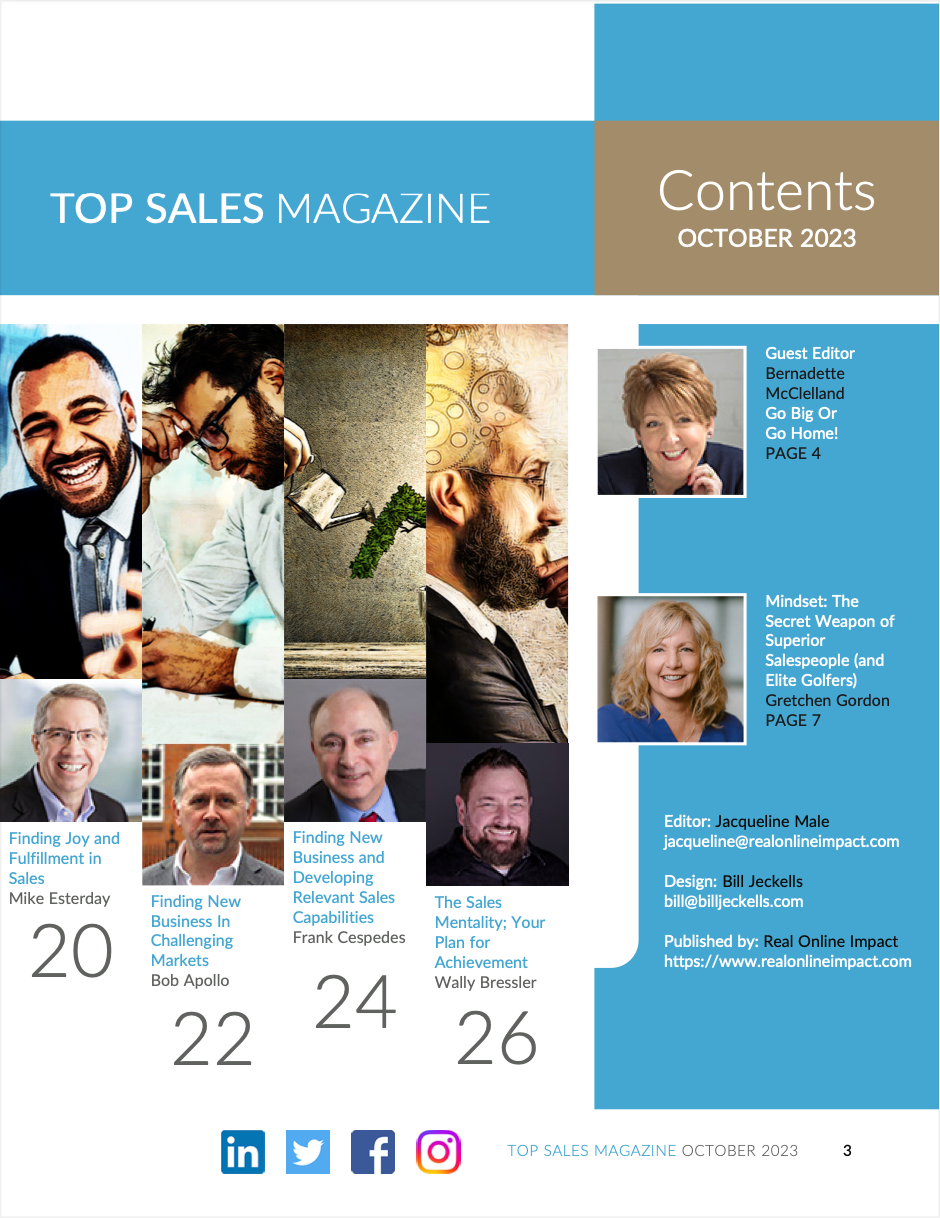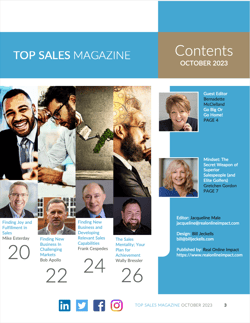Finding new business in challenging B2B markets
October 3, 2023

This article was originally published in the October 23 edition of Top Sales Magazine ...
 Finding and winning new business is tough at any time. Many salespeople - particularly less experienced ones - are finding it particularly tough in the current business climate. In addition to a range of global confidence-sapping challenges that are delaying business investment decisions, many prospective customers in the UK are increasingly suffering from the added self-inflicted wound of Brexit.
Finding and winning new business is tough at any time. Many salespeople - particularly less experienced ones - are finding it particularly tough in the current business climate. In addition to a range of global confidence-sapping challenges that are delaying business investment decisions, many prospective customers in the UK are increasingly suffering from the added self-inflicted wound of Brexit.
This is not just about uncovering and engaging the right sort of prospects at the top of the sales funnel: towards the bottom of the sales funnel, it’s also about persuading apparently-well qualified prospects to take action now, rather than delay until later. More than ever before, salespeople need to focus their energies where they will generate the best outcomes - and this means making smart sales decisions in everything we do.
Addressing top-of-funnel challenges
Prospecting for new business should never be seen as primarily or largely a volume game. In fact, focusing on the quantity of outreach can be completely unproductive - swamping an unreceptive audience with irrelevant messages that not only fail to generate a response but also have the effect of making them avoid any contact in the future when they could actually have a need that we could satisfy.
Both reputationally and in terms of generating positive short-term responses, the quality of our outreach matters, and this requires that salespeople tailor their outreach around the following 4 elements:
- We need to identify and target the common business issues (not functional needs) that we have a track record of successfully addressing and which our prospects - if they recognise the problem - are likely to want to deal with
- We need to identify the common characteristics of the organisations that are most likely to suffer from these issues - not just their demographics, but also their structural and behavioural/cultural characteristics (i.e., our Ideal Customer Profile)
- We need to identify and understand the key roles (sometimes called “buyer personas” by marketers) in these organisations who are likely to be responsible for dealing with these business issues
- We need to identify the key trends and trigger events that will cause the key roles in organisations with these issues to decide they need to deal with them sooner rather than later
If we don’t understand all of these factors, we will end up prospecting into an increasingly unreceptive void. Mastering these factors requires research. We must allocate a significant part of our selling time and energy to this research - because this will allow our subsequent attempts to reach out to our (now well-targeted) audience to be far more productive.
We must then carefully and consistently qualify all potential prospects as close to the top of our sales funnel as possible - and be ruthless about discarding prospects that fail to make the grade. There are few things more wasteful than using our scarce energies to pursue opportunities that are never going to close - and few things more deceptive than an apparently large pipeline that mostly consists of already-dead deals.
Addressing bottom-of funnel challenges
But even if we have qualified ruthlessly and executed flawlessly, we still face bottom-of-funnel challenges in persuading our prospects to choose us and to act now, rather than later. If we are to maximise our chances of winning new opportunities in a timely fashion, we need to ensure we have great answers to the four questions that every new business prospect will be asking themselves:
- Why do they need to act, rather than continuing on their current path?
- Why do they need to act now, rather than later?
- Why should they choose us, rather than any other option?
- Why should they trust us to ensure they achieve their intended outcomes?
If the answer to any one of these 4 questions is weak or missing, and particularly if the buying decision is seen to be a significant one that has any risk of failure, our prospect is likely to defer a final decision and may even decide they can afford to stick with the status quo - at least for the moment.
FOMO vs. FOMU
Many salespeople have been coached to concentrate on their prospect’s Fear of Missing Out (FOMO) - that bad things will happen if they fail to take action. But as the authors of the recent bestseller “The Jolt Effect” point out, as the buying decision journey heads towards a conclusion, prospects are increasingly focused on their Fear of Messing Up (FOMU).
FOMU happens whenever a stakeholder becomes concerned that if they stick their neck out and promote or support an initiative that subsequently fails, then they will be associated with and bear some responsibility for that failure - with obvious negative implications for their reputation and their career.
That potential sense of personal responsibility is clearly less if the stakeholder simply acquiesces in the preservation of the status quo. It’s much harder for them to be blamed for going along with a decision to “do nothing”.
This is why it is so important - particularly in new projects with a new customer - that we do all that we can to boost every stakeholder’s confidence in both going ahead with the project and supporting our proposed approach. That process has to start from the very beginning of our customer’s buying decision journey rather than as a panic reaction to a last-minute delay.
About the Author
 Bob Apollo is a Fellow of the Institute of Sales Professionals, a founding contributor to the International Journal of Sales Transformation, a recognised Sales Futurist, and the driving force behind Inflexion-Point Strategy Partners, the leading proponents of outcome-centric selling.
Bob Apollo is a Fellow of the Institute of Sales Professionals, a founding contributor to the International Journal of Sales Transformation, a recognised Sales Futurist, and the driving force behind Inflexion-Point Strategy Partners, the leading proponents of outcome-centric selling.
Following a successful corporate career spanning start-ups, scale-ups and market leaders, Bob now works as a strategic advisor, mentor, trainer and coach to ambitious B2B sales organisations - teaching them how to differentiate themselves through their provably superior approach to achieving their customer's desired outcomes.


Comments